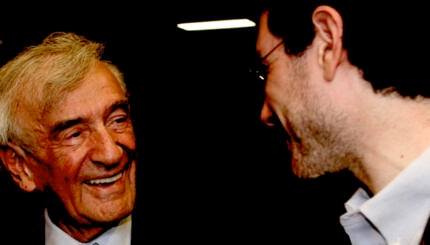Last night, Elie Wiesel began his lecture at the 92nd Street Y with a few words about Jean-Marie Lustiger, the French Cardinal who died this past summer.
Lustiger was, of course, born a Jew, and he was hidden by a Catholic woman during WWII. He later converted to Catholicism at the age of 13. Lustiger’s continued identification as a Jew has been well reported, and kaddish was recited at his funeral.
Wiesel and Lustiger were friends, and in struggling with the nature of Lustiger’s Jewishness, Wiesel decided to research the first Jewish convert to Christianity: Jesus.
What did he learn? According to Wiesel, Jesus was a passionate, interested, relatively normative Jew — a spiritual seeker, who had issues with the corrupt status quo. It was Paul and later Christian leaders, Wiesel asserted, who turned Jesus into the ultimate Jew-foil.
Hardly original or shocking. And probably not worth the $35 admission charge.
Perhaps most strangely, Wiesel never returned to discuss Lustiger. How did Jesus’ Jewishness affect Wiesel’s view of Lustiger’s identity? Was the lecture alluding to the possibility that an individual Christian could still be a good Jew?
I don’t think so. In all probability, Lustiger was merely a segue, not the actual topic of conversation. Which is disappointing, because then the question remains: What do we make of Lustiger’s Jewishness? What did Wiesel conclude about that?


